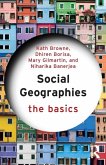Social Geographies: The Basics introduces what social geography is, and what it might be. It outlines the key contours of social geographies, and also disrupts some of the conventions of the discipline in both its content and structure.
This book approaches social geographies by beginning with the resistances, contestations and 'solutions' that communities use to challenge exclusions in place and space in order to create equitable societies. It then addresses the inequalities, precarities, and 'problems' that prompt these interventions. This allows the book to emphasise the importance of activism in the here and now, and to show how activism often makes issues visible and contested in ways that are then theorised by academics. Social Geographies starts with solidarities, communities, and networks before moving to examine difference, precarity, and mobilities. Each chapter offers key case studies that centre resistance, contestations of inequitable power, and local knowledges that can often be seen as 'solutions' to national and transnational issues, creating a decolonial understanding of 'social geography from below' within and across national contexts.
This book is essential reading for undergraduate students and readers new to the area, as well as anyone studying introductory geography, social, cultural and critical geography, 'the spatial turn' and issues of spatialities, and key issues like precarity, power, difference, equality, and mobilities.
This book approaches social geographies by beginning with the resistances, contestations and 'solutions' that communities use to challenge exclusions in place and space in order to create equitable societies. It then addresses the inequalities, precarities, and 'problems' that prompt these interventions. This allows the book to emphasise the importance of activism in the here and now, and to show how activism often makes issues visible and contested in ways that are then theorised by academics. Social Geographies starts with solidarities, communities, and networks before moving to examine difference, precarity, and mobilities. Each chapter offers key case studies that centre resistance, contestations of inequitable power, and local knowledges that can often be seen as 'solutions' to national and transnational issues, creating a decolonial understanding of 'social geography from below' within and across national contexts.
This book is essential reading for undergraduate students and readers new to the area, as well as anyone studying introductory geography, social, cultural and critical geography, 'the spatial turn' and issues of spatialities, and key issues like precarity, power, difference, equality, and mobilities.








